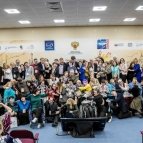CHILDREN, SOCIETY AND THE FUTURE III Congress on Mental Health: Meeting the Needs of the XXI Century
The III Congress on Mental Health: Meeting the Needs of the XXI Century was held, online, on 8-9 October 2021 in Moscow on the topic of Children, Society, and the Future.
The Congress, under the patronage of the Ministries of the Russian Federation of Education, Health, Sports and Social Policy, and organized by the Union for Mental Health in cooperation with the Russian Society of Psychiatrists, the Russian Psychological Society, the All-Russian Professional Psychotherapeutic League, and supported by international professional organizations including the World Psychiatric Association (WPA), the World Association of Social Psychiatry (WASP), the World Council for Psychotherapy (WCP), the International Association of Applied Psychology, the International Association for the Improvement of Mental Health Programs (AMH), the International Association of Child and Adolescent Psychiatry and Allied Professions, the International College of Person Centered Medicine, the World Association for Dynamic Psychiatry (WADP), brought together representatives from 37 countries for a total of 10,800 attendees. Attendees included leaders, specialists, and members of organizations in diverse fields, including the healthcare system, social protection, labor, science and education, culture and the arts, physical culture and sports, rehabilitation, economics and law, governments, non-profit organizations, private sector enterprises, and media.
The Congress aimed to preserve and enhance the mental health and well-being of children and adolescents, necessary for the healthy development of families, communities, and societies, and the future of human civilization, through discussions about medical and non-medical content, challenges, and methodologies, with interdisciplinary, multi-sectoral and multi-stakeholder exchange, contribution, and cooperation.
This aim is consistent with the United Nations Agenda 2030 for Sustainable Development, adopted in 2015 by the 193-member countries of the United Nations, which acknowledges the importance of promoting mental health and wellbeing in target 3.4 and in the preamble. Children are referred to nineteen times in the various goals, including about ending poverty and hunger, ensuring healthy lives and quality education, reducing inequality, and promoting peace.
The aims of this Congress are further aligned with other major internationally-agreed-upon instruments, including, but not limited to, those by the World Health Organization (WHO), namely, the WHO Comprehensive Mental Health Action Plan for 2013–2020 (extended to the year 2030) and the WHO Human Rights Campaign; as well as numerous documents of the United Nations, including, the Convention on the Rights of the Child; the Global Strategy for Women’s, Children’s and Adolescents’ Health (2016–2030), the Convention on the Elimination of All Forms of Discrimination against Women; the Global Compact for Safe, Orderly and Legal Migration;, the Sendai Framework for Disaster Risk Reduction 2015¬2030; the Political Declaration of the Third High-Level Meeting of the General Assembly on the prevention and control of noncommunicable diseases;, the Resolution on Universal Health Coverage;, the United Nations Human Rights Council Resolution on Mental Health and Human Rights, the UN Standard Minimum Rules for the Administration of Juvenile Justice; and the Convention on the Rights of Persons with Disabilities, calling for the elimination of all forms of discrimination, stigma, violence and abuses in the context of child and adolescent mental health and the provision of access to people-centered services.
Attendees at this Congress discussed critical issues in child and adolescent mental health and well-being with regard to nine areas: (1) early diagnosis and prevention of mental disorders; (2) treatment and psychosocial rehabilitation; (3) professional training of medical and non-medical child and adolescent specialists; (4) mental health conditions of gifted children; (5) mental health conditions of the most vulnerable child populations; (6) the impact of physical culture and sports; (7) the impact of culture and art; (8) educational environments affecting child and adolescent mental health; and (9) legal frameworks.
Attendees at this Congress adopted the Declaration where they indicated the crucial importance of preventive measures and rehabilitation services at early stages of life, to preserve young people’s mental health, and to develop their holistic capabilities, including emotional, physical, cognitive, spiritual, social, and economic, which, in turn, are critical for the well-being and prosperity of any socio-economic system in modern society.
In the context of the peculiarities of child development at each age stage, the Congress participants called for the need to form national interdisciplinary and intersectoral strategies and programs aimed at protecting the mental health and well-being of children and adolescents.
More: https://www.youtube.com/channel/UCp7gclHvgmu_u5cCXv1VCCA; http://www.mental-health-congress.ru/en/









